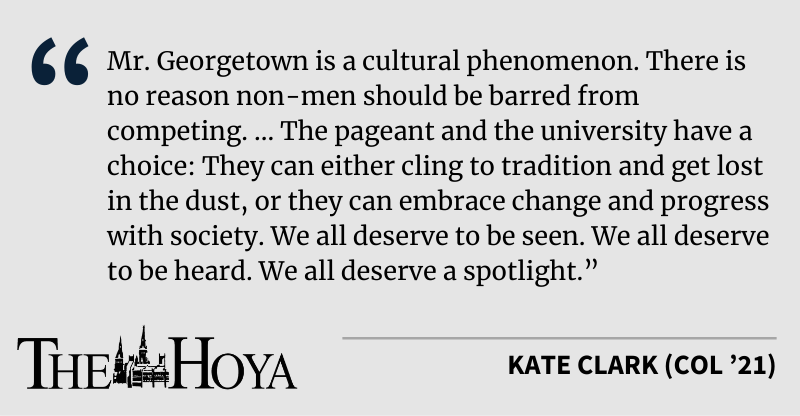Every year, clubs at Georgetown University nominate senior male members as competitors in a pageant known as “Mr. Georgetown.” During my first three years at Georgetown, I heard of the show’s admittance of only male contestants, but I dismissed it, assuming that the Georgetown Program Board, which runs the pageant, just needed a push to permit contestants of any gender. The world at large has started to embrace inclusion, creating opportunities for people to feel safe in being and showing off their true selves. I had hoped Mr. Georgetown would follow suit and become a space for anyone to share their talents.
I was wrong. GPB continues to exclude non-men, citing historical precedence. This exclusivity represents a larger issue on campus: the honoring of tradition over inclusion. The university sets this example by claiming that its mission is “people for others” while funding the anti-LGBTQ rights club Love Saxa and refusing to affiliate with the reproductive justice group H*yas for Choice. While the exclusion of non-men from Mr. Georgetown is microscopic compared to these examples, it adds to an environment of tradition superseding societal change and hurting students.
The board of Nomadic Theatre, a co-curricular theater group on campus devoted to social engagement, received an email asking for our representative for the pageant and, though the executive producer nominated me as Mr. Nomadic Theatre immediately, I received no reply. In the meantime, another Nomadic board member mentioned that the pageant was looking for a woman co-host and put me in contact with a representative of Mr. Georgetown. The representative told me that I couldn’t be a contestant as the event was historically male-only; instead, she offered me a co-host position. I accepted the offer on the phone, glad that I could still be part of the pageant, but as I considered it more, the pageant’s refusal to include non-male competitors left me bewildered.
I inquired again about participating as a contestant. The representative gave me a litany of explanations as to why I couldn’t: Because of the COVID-19 pandemic, GPB was restructuring the pageant for the virtual environment and thus didn’t have time to become more inclusive; it was too late to reopen nominations; it wouldn’t be fair not to give other non-men the chance to compete.
The explanations changed each time I asked another question. I wondered why they hadn’t changed this rule yet, why they hadn’t notified me earlier about not being allowed to compete and what the virtual restructuring had to do with exclusion.
My base question of “why” was never truly answered, and each explanation fell flat. I felt like a child again, sulking when my brother wouldn’t let me play with him because I was a girl. I was being sidelined because of my gender yet again.
The representative stopped speaking with me after I posited that GPB must have some fundamental intolerance if no one else had considered expanding the pageant to include non-men. The co-host offer stood, but it required that I be a positive ambassador for the event. I couldn’t promote an event stuck in such an archaic frame of mind. Nor could I be GPB’s woman poster child, implicitly declaring that this restrictive contest was okay with me, so it must be okay with all women. I declined the position.
Declining the co-host offer meant that I was officially not part of Mr. Georgetown. I was devastated, and letting go felt impossible for me. Growing up, whenever I tried to stand up for myself, I was told I was too sensitive. I know now that being too sensitive is better than the alternative. This small experience opened my eyes to a greater pattern of exclusion on campus.
Georgetown College didn’t admit women until 1969 — 138 years after Mississippi College became the first coeducational college in the United States. H*yas For Choice started in 1991 as a university-affiliated club called GU Choice until backlash became so intense that the university stripped the club of its university status. Georgetown’s health center still doesn’t prescribe nor allow its pharmacy to fill prescriptions for birth control for contraceptive purposes.
Georgetown is a historic Jesuit university, but that does not mean it needs to adhere to anachronistic principles. These deliberate ostracisms create a hurtful campus environment. Georgetown has made strides since its founding, but it has more progress to make.
Mr. Georgetown is a cultural phenomenon. There is no reason non-men should be barred from competing. Georgetown students deserve an inclusive campus, which includes GPB and Mr. Georgetown. The pageant and the university have a choice: They can either cling to tradition and get lost in the dust, or they can embrace change and progress with society. We all deserve to be seen. We all deserve to be heard. We all deserve a spotlight.
Kate Clark is a senior in the College.









